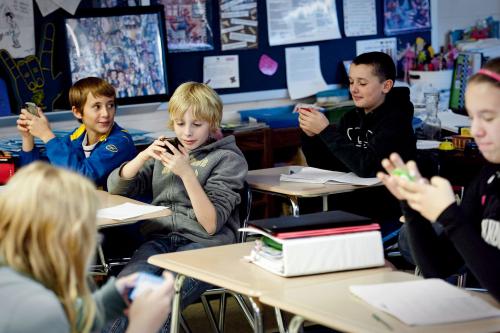Cell Phones In Class?

December 29, 2016
Should students be allowed to use their phones during class? Students everywhere usually carry their phones to school and even to class. So why not use them?
But a team of scientists did an experiment at Fern Creek High School in Louisville to see if phones made an impact on learning. They found that students who use their phones for non-class-related things did worse on tests and with taking notes than the students who didn’t use their phones. Non-phone users scored 13 percentage points (a letter grade and a half) higher on a test and did 62 percent better at taking notes. They also remembered more information from a lecture than students who used their mobile devices.
But a second experiment found out that when students only used phones for class-related matter, students scored up to 14 percentage points higher than the students using their phones for unrelated content. The experiment results suggests that the best option is to not use phones during class unless it is for accessing content. The problem is with monitoring how a device is being used. While some kids can switch attention between using a phone as an entertainment device and as a learning tool, not all can.
This may be because of increasing evidence that cell phones are addictive. A behavioral addiction, similar to a gambling addiction, can make it impossible for teens (and even adults) to resist the temptations of phone use. According to psychguides.com, one may suffer from a cell phone addiction or nomophobia, the fear of being without a mobile phone, if he or she exhibits these signs or symptoms:
- Appears anxious when phone battery is low.
- Panics if cell phone is misplaced or service is unavailable.
- Spends more time connecting online than connecting with people in real life.
- Sleeps with the smartphone on or under the pillow.
- Uses the phone in dangerous situations such as driving.
- Has his or her smartphone on the table during meals.
- Believes the cell phone to have rung or vibrated when it hasn’t.
When ten randomly-selected MMS eighth graders were shown this list, nine reported having at least five of the symptoms.
Despite the threat of addiction, many think phones still have a place in classrooms. Seventy-three percent of Advanced Placement and National Writing Project teachers said their students use phones in the classroom or to complete assignments. Cell phones can be a great resource, according to 22-year teaching veteran Ken Halla, who transformed his classroom into a mobile device friendly zone. “Not every classroom can get a laptop every day, so [devices like smartphones] become something useful for teachers,” Halla says. At Mayfield Middle, 18 out of the 25 teachers questioned said they sometimes allow students on their phones with rules or permission. 24 out of the 25 said students should be allowed to use their phones for school-related work.
Here are the five most popular reasons to allow phones to be present in the classroom:
- In preparation for a real world job
- To teach responsibility
- To avoid double standards
- In case of emergency
- As learning aids
Do the teachers at MMS agree with these reasons?
Only 6 of the 25 asked said they thought having access to phones in class prepares students for the real world. Mrs. Beard stated, “Actually the opposite is true. Allowing students to use their phones or text constantly deprives them of the ability to form face to face relationships. How will they be able to sit in an interview and actually talk to another person and respond to questions without looking down? How will they be able to write without abbreviating every other word?” Mr. Carlson said, “Technology has been changing so rapidly that it’s impossible to predict what devices students will use when they get to college or enter a career. More importantly, the only real preparation for the future consists of learning how to think critically, solve problems, work with others, and ask good questions. These skills can be developed with or without technology.”
Many others remarked that phones are too distracting, even for working adults. One staff member said, “Soon a person is answering or sending texts, shopping, etc. Many jobs do not want their employees using phones while they are working.” Another remarked, “People on their phones at ‘real jobs’ or in college aren’t doing their best work. They are not putting in their best effort.”
Most MMS teachers also expressed concern that cell phones do not teach responsibility but rather require a level of responsibility that middle schoolers are not developmentally ready to demonstrate. Mrs D’Amico said, “Let high school prepare them to use their phones for college. There is too much cyber bullying in middle school, and phone use must be limited.” Mrs. Beard agreed. “More and more, one of my roles is to monitor and guide students in socially responsible and appropriate methods of communication. At times adolescents make very poor choices and doing so in school can lead to students being exposed to situations that they shouldn’t be.”
While a common argument for cell phones being in classrooms is for use during an emergency, 63% of MMS teachers disagreed. Mrs. Bean noted that “parents and caregivers know where their kids are at all times when they are here. If something were to happen, teachers can follow proper procedures for the students’ safety. That isn’t the case when all of the kids are calling, tweeting, etc., in the event of an emergency.” Kenneth Trump, president of National School Safety and Security Services, also thinks phones in classrooms pose a problem. He said, “There’s a huge difference between feeling safer and being safer.” He says that students’ cell phone use during emergencies can increase the spread of rumors about the situation, increase traffic at a scene, and overload cell-phone systems in the area.
Yet Mayfield teachers could not deny the academic benefits of phones, though. Teachers have students use phones to access videos, research information, look up unknown words, set reminders for classwork or tests, take pictures of class notes or samples, listen to audio books, or play review games. Many noted that it is often faster to allow a student to access information on a personal phone than to login to a computer. Mrs. Potts-Peteritis said, “In class we sometimes need to look up something that has to do with what we are studying. Having that information at our fingertips is just sometimes too good to pass up.”
Mr. Catullo believes, “Phones are part of students’ lives and trying to deny that fact isn’t productive or realistic to what’s important to students.” He added, “In life I look up information on my phone all the time. It is the reality of the world in which we are living. Information is at our fingertips; that accessibility should be utilized, not taken away.”
Overall, teachers at MMS are open to the advantages of personal technology in the classroom but worried about misuse. Maybe the best answer is to educate students about appropriate use, monitor distractions, and balance tech with an emphasis on face-to-face communication skills.










